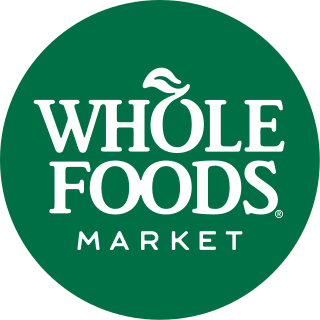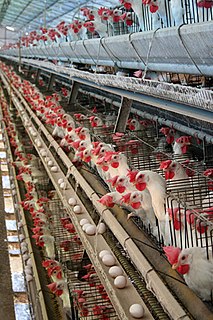
Poultry are domesticated birds kept by humans for their eggs, their meat or their feathers. These birds are most typically members of the superorder Galloanserae (fowl), especially the order Galliformes.

Animal husbandry is the branch of agriculture concerned with animals that are raised for meat, fibre, milk, eggs, or other products. It includes day-to-day care, selective breeding and the raising of livestock. Husbandry has a long history, starting with the Neolithic revolution when animals were first domesticated, from around 13,000 BC onwards, antedating farming of the first crops. By the time of early civilisations such as ancient Egypt, cattle, sheep, goats and pigs were being raised on farms.

The domestic turkey is a large fowl, one of the two species in the genus Meleagris and the same species as the wild turkey. Although turkey domestication was thought to have occurred in central Mesoamerica at least 2,000 years ago, recent research suggests a possible second domestication event in the southwestern United States between 200 BC and AD 500. However, all of the main domestic turkey varieties today descend from the turkey raised in central Mexico that was subsequently imported into Europe by the Spanish in the 16th century.

Whole Foods Market, Inc. is an American multinational supermarket chain headquartered in Austin, Texas, which sells products free from hydrogenated fats and artificial colors, flavors, and preservatives. A USDA Certified Organic grocer in the United States, the chain is popularly known for its organic selections. Whole Foods has 500 stores in North America and seven in the United Kingdom as of March 4, 2019.

Pastured poultry is a sustainable agriculture technique that calls for the raising of laying chickens, meat chickens (broilers), and/or turkeys on pasture, as opposed to indoor confinement. Humane treatment and the perceived health benefits of pastured poultry are causing an increase in demand for such products.

There are different systems of feeding cattle in animal husbandry, which may have different advantages and disadvantages. Most cattle in the US have a fodder that is composed of at least some forage. In fact, most beef cattle are raised on pasture from birth in the spring until autumn. For pastured animals, grass is usually the forage that composes the majority of their diet. Cattle reared in feedlots are fed hay supplemented with grain, soy and other ingredients in order to increase the energy density of the feed. The debate is whether cattle should be raised on fodder primarily composed of grass or a concentrate. The issue is complicated by the political interests and confusion between labels such as "free range", "organic", or "natural". Cattle raised on a primarily foraged diet are termed grass-fed or pasture-raised; for example meat or milk may be called grass-fed beef or pasture-raised dairy. The term "pasture-raised" can lead to confusion with the term "free range", which does not describe exactly what the animals eat.

Free-range eggs are eggs produced from birds that may be permitted outdoors. The term "free-range" may be used differently depending on the country and the relevant laws, and is not regulated in many areas.

Free range denotes a method of farming husbandry where the animals, for at least part of the day, can roam freely outdoors, rather than being confined in an enclosure for 24 hours each day. On many farms, the outdoors ranging area is fenced, thereby technically making this an enclosure, however, free range systems usually offer the opportunity for the extensive locomotion and sunlight that is otherwise prevented by indoor housing systems. Free range may apply to meat, eggs or dairy farming.
In animal husbandry, feed conversion ratio (FCR) or feed conversion rate is a ratio or rate measuring of the efficiency with which the bodies of livestock convert animal feed into the desired output. For dairy cows, for example, the output is milk, whereas in animals raised for meat the output is the flesh, that is, the body mass gained by the animal, represented either in the final mass of the animal or the mass of the dressed output. FCR is the mass of the input divided by the output. In some sectors, feed efficiency, which is the output divided by the input, is used. These concepts are also closely related to efficiency of conversion of ingested foods (ECI).

Hillside Animal Sanctuary, based in Frettenham, Norwich, and with a site at West Runton, North Norfolk, is the United Kingdom's largest home for different kinds of farm animals and horses. The vegan-run sanctuary is funded entirely on public donations. The sanctuary was established by Wendy Valentine and its patron is actor Martin Shaw.

Organic egg production is the production of eggs through organic means. In this process, the poultry are fed organic feed. According to the United States Department of Agriculture, organic means that the laying hens must have access to the outdoors and cannot be raised in cages. Only natural molting can occur within the flock; forced molting is not allowed. Organic certification also requires maintenance of basic animal welfare standards.

Intensive animal farming or industrial livestock production, also known by its opponents as factory farming, is a type of intensive agriculture, specifically an approach to animal husbandry designed to maximize production, while minimizing costs. To achieve this, agribusinesses keep livestock such as cattle, poultry, and fish at high stocking densities, at large scale, and using modern machinery, biotechnology, and global trade. The main products of this industry are meat, milk and eggs for human consumption. There are issues regarding whether intensive animal farming is sustainable or ethical.

Poultry farming is the form of animal husbandry which raises domesticated birds such as chickens, ducks, turkeys and geese to produce meat or eggs for food. It has originated from the agricultural era. Poultry – mostly chickens – are farmed in great numbers. More than 60 billion chickens are killed for consumption annually. Chickens raised for eggs are known as layers, while chickens raised for meat are called broilers.

Animal feed is food given to domestic animals, especially livestock, in the course of animal husbandry. There are two basic types: fodder and forage. Used alone, the word feed more often refers to fodder. Animal feed is an important input to animal agriculture, and is frequently the main cost of the raising animals. Farms typically try to reduce cost for this food, by growing their own, grazing animals, or supplementing expensive feeds with substitutes, such as food waste like spent grain from beer brewing

Direct Action Everywhere (DxE) is an international grassroots network of animal rights activists founded in 2013 in the San Francisco Bay Area. DxE uses disruptive protests and non-violent direct action tactics, such as open rescue of animals from factory farms. Their intent is to build a movement that can eventually shift culture and change social and political institutions. DxE activists work to "put an end to the commodity status of animals."
Animal welfare and rights in Canada is about the laws concerning and treatment of nonhuman animals in Canada. Canada has been considered to have weak animal welfare protections by the organization World Animal Protection. The vast majority of Canadians are for further animal protections, according to a poll conducted on behalf of Mercy for Animals.
Animal welfare and rights in Indonesia regards the treatment of and laws concerning non-human animals in Indonesia. Indonesia has limited animal welfare regulations by international standards.
The Good Food Institute (GFI) is an international 501(c)(3) nonprofit that promotes plant-based alternatives to meat, dairy, and eggs as well as cultivated meat, as alternatives to the products of conventional animal agriculture. GFI has roughly 70 staff in the United States, plus affiliates in India, Israel, Brazil, Asia Pacific, and Europe. GFI engages scientists, policymakers, and entrepreneurs to advance plant-based products and cellular agriculture. GFI creates open-access resources and publishes scientific research about plant-based and cell-based meat technology. The nonprofit also helps established food service providers, restaurants, major meat producers, and food companies to expand into alternative proteins. In September, GFI holds § The Good Food Conference to "[accelerate] the marketplace for plant-based and cell-based meat." A primary focus of the Good Food Institute is lessening global warming, antimicrobial resistance, global poverty, and intensive animal farming by influencing industry, scientists, investors, entrepreneurs, and policymakers.

This article is about the treatment of and laws concerning non-human animals in Australia. Australia has moderate animal protections by international standards.
Farm Forward is a 501(c)(3) nonprofit whose mission is to promote conscientious eating, reduce farmed animal suffering, and advance sustainable agriculture. Farm Forward aims to eliminate the most harmful practices in intensive animal agriculture, increase the market share of humane and sustainable animal agriculture, and raise awareness about the cultural significance of animal agriculture.













